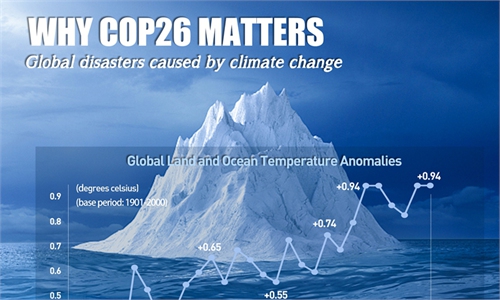
China, US Illustration: Chen Xia/GT
Editor's Note:The 26th UN Climate Change Conference of the Parties (COP26) kicked off on Sunday in Glasgow, the UK. Leaders of developing countries urged rich ones to fund climate goals at COP26 at the gatherings. What responsibilities should developed and developing countries take to execute global emission reductions? For the industrialized developed countries, what substantive contributions can they make to global emission reductions? Jennifer Morgan (Morgan), executive director of Greenpeace International, talked about these issues with Global Times (GT) reporters Yu Jincui and Lu Yuanzhi.
GT: The Glasgow meeting is being described as "the world's last best chance" to prevent global warming from reaching dangerous levels. What's your take on the significance of the meeting? What are your expectations for COP26? What challenges may it encounter?
Morgan: Glasgow is a critical moment for the global climate process. When the Paris Agreement was reached in 2015, countries decided to check on their progress at this COP in Glasgow. The result does not look promising. We are on a 2.7 C temperature increase trajectory, and that is if all the commitments made by countries are fulfilled. Clearly, we need more ambition from all countries - the ones who put down modest NDCs to enhance them and the ones who put strong targets to make them a reality.
GT: New analysis suggests that on the eve of COP26, rich countries will continue to miss a longstanding pledge to provide poor countries with $100 billion a year in climate finance for the next four years. If the demand for funding of developing countries cannot be met, what influence will this have on the global response to climate change and the results of COP26?
Morgan: Glasgow is about ambition, but it is also about trust. Past promises need to be fulfilled. That's the basis of a credible global regime. It is disappointing that developed countries are not delivering the $100 billion finance goal. This gap needs to be urgently filled. More finance needs to go to climate adaptation. Major economies should also start a discussion on what to do with climate finance after 2025. At COP26, we will hear voices from the frontlines, the vulnerable countries whose sheer existence is threatened by climate change. That should trigger more moral responsibility and leadership from the developed world.
GT: What responsibilities should developed and developing countries respectively take in global emission reduction efforts? For the industrialized developed countries, what substantive contributions can they make for global emission reductions?
Morgan: There is no solution to climate change if we don't have all hands on deck. Rich countries need to play the champion's role. They have more capacity and experience and should decarbonize faster. In the meantime, they have a responsibility to help others. But all countries need to step up. We are in a climate emergency.
GT: In an interview with Bloomberg, you mentioned that, "US President Joe Biden has returned the world's richest nation to the table." We all know that former president Donald Trump withdrew from the Paris Agreement. Republicans tend to hold very different views with Democrats in terms of climate change. If Trump or the Republicans are elected again, how will it affect the US' commitment in reducing emissions and the global governance to tackle climate change? Bloomberg quoted you, saying that in more than two decades, you have "never seen the geopolitical backdrop change as dramatically as it has ahead of COP26 in Glasgow, Scotland." With tensions between China and the US, what is your expectation for China and the US in the regard of cooperation in climate change?
Morgan: The climate crisis will only be solved with the US and China moving toward the same goal: bringing GHG emissions in line with a 1.5 C trajectory. The two nations contribute almost 40 percent of global emissions and are powerful political and economic forces. When they move, others follow. Unfortunately, neither the US nor China has shown sufficient global climate leadership - while China is strong on delivering its targets, its level of ambition does not match climate science. The US has ambitious targets, but has yet to demonstrate how it will deliver without being derailed by domestic politics. On the US state and local level, pressure is mounting from people for climate action and this will not let up.
Despite their political differences, Washington and Beijing are paralyzed by the same political problems - in China, entrenched coal interests taking advantage of the current power crisis to delay climate action; in the US, the Republican Party, backed by the fossil fuel industry, which almost uniformly opposes ambitious climate action, and a Democratic senator from a coal-rich state is dampening the ambition of Biden's climate agenda.
The current state of the bilateral relationship makes climate engagement more difficult between the US and China than a few years ago. But engagement is needed. The two can't afford to "de-couple" on climate change as they do in other issues.
A strained relationship does not need to be a deal breaker for parallel climate action. The US and Soviet Union managed to reduce nuclear warheads not because they were friends with each other, but because they saw the significant benefits of synchronized action. This trust does not exist between Washington and Beijing now. To restore trust in each other's climate action, both sides need to come up with stronger ambition and demonstrate that they are actually implementing.
Going forward, the US and China should find more reasons within their respective systems for further climate ambition, rather than using each other's behavior as an excuse for inaction.
GT: Documents leaked by Greenpeace say that Australia sought to change a major international report on climate change to promote a future for coal-fired power and downplayed the influence of fossil fuel lobbyists. Furthermore, Australia's newly released plan to net zero was criticized as a scam. How do you comment on Australia's performance in cutting emissions and dealing with climate change?
Morgan: Any country that sticks to its addiction to coal should open its eyes and look around the world. Increasingly, the world is moving away from coal. The choice for countries like Australia is clear - they either stay in the 19th century or embrace the modern age where climate action is not only necessary for the environment, but will increasingly create economic competitiveness.
The science is crystal clear on fossil fuels and even the International Energy Agency has spelled it out: If you're in a hole, stop digging.



